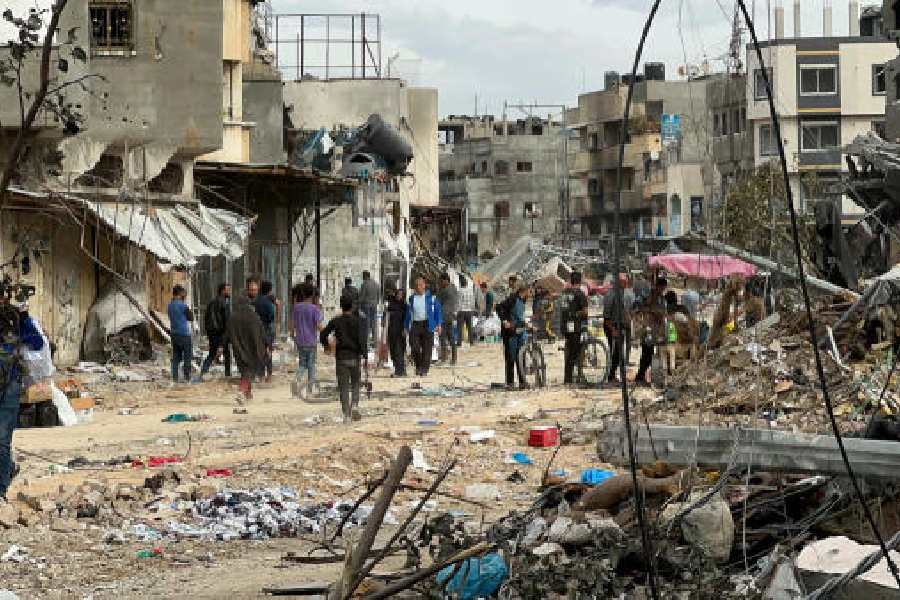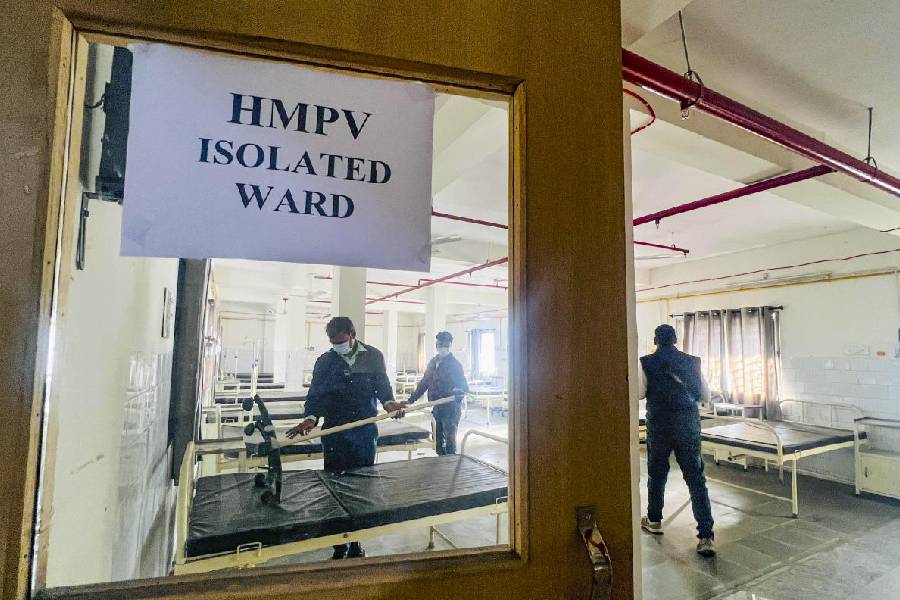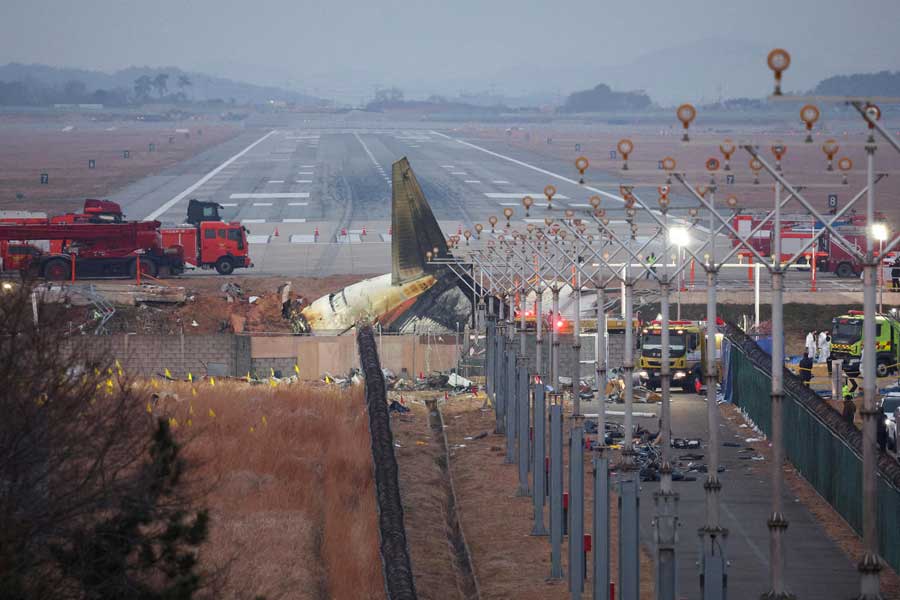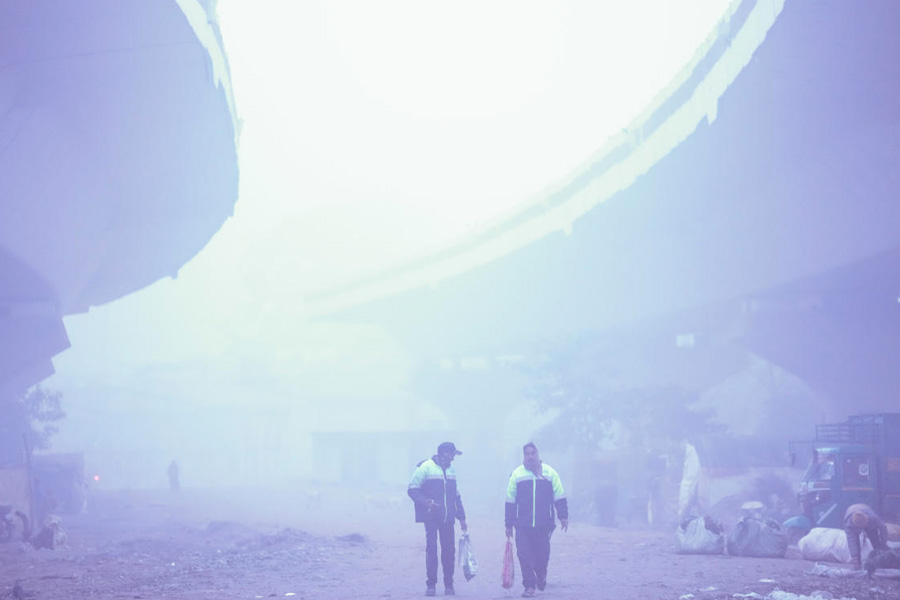Namzi Mwafi, 23, has one job, day in and day out: find water for his family.
Dozens of his extended family members are sheltering together in a two-bedroom apartment in Rafah, a city in southern Gaza near the territory’s border with Egypt, he says. The oldest, his grandmother, is 68; the youngest, a cousin, is 6 months old.
To keep them alive, Mwafi says he wakes up at 4am, spending hours waiting for water at a crowded filling station. Sometimes, he has to fight to keep his place in line and sometimes there is nothing left when his turn comes.
When he is lucky, he pushes his heavy trolley home through the sand and the family rations the haul to about a glass a day each.
There is practically no gas or other fuel left in Gaza, according to the United Nations agencies operating there, so some people are building makeshift clay or metal ovens to cook. Firewood and coal have also largely run out, so families are burning stripped-down doors, shutters and window frames, cardboard and grasses. Some simply do not cook, eating raw onions and eggplants instead.
“We went back to the Stone Age,” Mwafi said.
In response to the devastating October 7 attack on Israel by Hamas, the group that controls the Gaza Strip, Israel imposed what it called a complete siege — cutting off almost all water, food, electricity and fuel for the more than two million Palestinians living in Gaza. It also launched thousands of airstrikes on the enclave and sent in ground forces to try to root out Hamas.
A brief ceasefire, the first since the war began seven weeks ago, began to take hold on Friday, and as part of a hostage agreement between Israel and Hamas, dozens of trucks with water and other vital humanitarian aid crossed into Gaza.
Still, it was far less than what typically came into the territory before the war, and there was no indication that the freer flow of aid would last beyond the four-day agreed truce.
Before the ceasefire, little humanitarian aid — far short of what Gazans need — had been trickling in. And so, from the north to the south, in tented camps, apartments, schools and hospitals, residents crammed together in ever-shrinking spaces have been struggling every day to meet their most basic needs.
Surviving has become a full-time, perilous undertaking.
Days start well before dawn. Tasks seem simple: Fetch water. Bake bread. Buy diapers. Stay alive.
But people do not always succeed.
Mineral water trucked into the territory in aid convoys has been enough for only 4 per cent of the population, according to the United Nations World Food Programme. Some desalinated water is still being distributed in the south, but the north has no potable water sources left, according to the UN. People who cannot access the scarce mineral and desalinated water rely on brackish water from wells, which the UN has said is not safe for human consumption.
Flour, too, is running out and most wheat mills have been bombed, according to the United Nations. Humanitarian agencies have managed to deliver bread, canned tuna and date bars to about a quarter of the population since October 7, but distribution is hampered by fighting and the siege, the World Food Programme said. Some farmers are slaughtering their animals, trading their future livelihoods for the emergency at hand.
The World Food Programme has warned that only 10 per cent of the food Gaza needs has entered the territory since the war began, creating “a massive food gap and widespread hunger”.
“Wheat flour, dairy products, cheese, eggs and mineral water have completely disappeared,” in the market, Alia Zaki, a spokesperson for the World Food Programme, said this month.
The virtual collapse of the sewage system and displacement of about 1.7 million Gazans, who have poured into camps and crowded into relatives’ homes, have also brought on a hygiene crisis and illnesses that the WHO warns could get much worse.
Diarrhoea, scabies and lice are ripping through the population, hitting younger children particularly hard.
Mwafi said he graduated from college with a degree in computer engineering a month before the war. He dreamed of a life in Canada as a videographer and had just started dabbling in content creation. His social media before October 7 shows a young man with a bright smile at his graduation, surrounded by friends and family.
His posts were unreservedly upbeat, full of Quranic quotes and pop culture affirmations about positive living, love, friendship and hope. Now they are all about staying alive.
“Our strategy right now is how to survive for the longest period possible,” he said.
“If before I had ambitions and hopes for a good future and fulfilling the dreams I had as a child,” he said, “now my utmost ambition is to be able to eat, drink water and sleep.”
The vast majority of shops are now shut or empty, and people are mostly buying and selling goods informally, according to the United Nations. With electricity out and most banks closed, the few who do have funds cannot get them. Even if they could, there is not much to buy.
In May, Lujayn al-Borno, 35, her husband and their four children fled Sudan, then a month into a civil war, for their native Gaza. They knew that returning to their homeland would be hard after 13 years of prosperity and relative stability in Sudan. But they had cash and family in Gaza, so they figured they were better off than most.
They quickly settled in an apartment in the upscale Gaza City neighbourhood of Rimal in the north.
Then, on October 7, hours after the Hamas-led attack on Israel, al-Borno said the family received a call from the Israeli military to evacuate their building because it was going to be hit in one of the war’s first airstrikes. They fled for the southern city of Khan Younis and sheltered with extended family in a small apartment that was still under construction.
Al-Borno visits a nearby shop every day, but usually it’s empty.
“I go look for food for my children on foot, and I find nothing,” she said. “I cry the whole way back home.”
But her persistence and the cash she still has occasionally pay off. Recently, she said she managed to secure two packs of diapers for Jameel, her toddler, but only after a long trek to another part of Gaza.
Al-Borno also bought blankets off a displaced family that had received them for free as humanitarian aid, she said. They were so desperate for food that they were prepared to go cold.
Aya Ibrahim, 43, is sheltering with her children in a UN-run school in the Nuseirat camp in central Gaza.
“The bathrooms here are very bad. They are all blocked up because we have no water at all,” Ibrahim said. The men and boys, including her two teenage sons, sleep near the toilets, the women in a classroom one floor up.
“The smell is killing us,” she said. Some women prefer to relieve themselves in nylon bags in a bucket behind a makeshift curtain in the classroom where they sleep.
Ibrahim said the United Nations distributed one pack of sanitary pads for the 30 women sharing the classroom with her.
Amal, another woman in the same shelter, said she was so desperate because of the lack of sanitary pads that she had started taking birth control pills to stop her period altogether.











